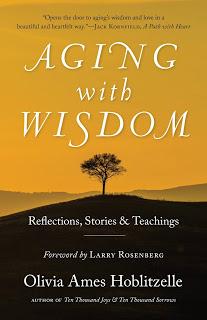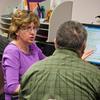
Published November 14, 2017.
Since her forties, Olivia Ames Hoblitzelle has collected quotes, stories, and her own thoughts in a file labeled "Aging and Wisdom."In her late seventies, this project came to fruition as a 2017 book, Aging with Wisdom: Reflections, Stories & Teachings.
The insights from this book, of course, are drawn from a broader source than a manila file folder. Hoblitzelle has experience as a therapist, writer, and speaker. She draws from both Western and Eastern traditions, from quests of the mind and of the body.
The result is a book that conveys a tone of "Softness and Ease" (one of her chapter titles) that also offers quiet strength on how to negotiate the Second Half of life.
Summarizing the book proves challenging since its power rests in how the book serves as a catalyst for individual meditation.
I found myself reading some passages slowly so that I could review events from my life in light of the chapter before me. Some of the sections address age-related challenges and opportunities I have yet to encounter. Consequently, I hope to reread this book as my life situation shifts over the coming decades.
The book itself isn't strictly linear. Many of the chapters return to previously discussed topics but through a different lens. In the conclusion, Hoblitzelle points out these recurring themes on page 185:
- Rejoicing in the blessings we still have
- Letting go of our struggle with life
- Acceptance of loss and change
- Seeing beauty in old age
- Cultivating lightness and humor
- Deepening awareness through meditation
- Opening to the unknown
- Making friends with death
- Cultivating the life of the spirit
Although not listed above, I see other recurring themes as follows: turning from doing to being, shifting from quantity to quality, and living in the moment. These themes appear throughout her book, but here is one passage that conveys them:
"A gradual slowing down is a natural part of the aging process. It is a gift, often received with a sense of relief, even delight. With this gift, we may become more aware of the quality of our lives--the rhythm of the ady and a sense of balance that might have eluded us in the hurly burly of the workplace" (p. 69).
I'm grateful for the quiet strength conveyed by this book.
The book includes several short chapters on Hoblitzelle's "wayshowers," people who have guided her path into late adulthood. I am grateful for Hoblitzelle as one of my "wayshowers." I look forward to receiving her counsel with subsequent rereadings.
Related: Books on Aging and Spiritual Growth Robert Peck's Tasks for Older Adults

